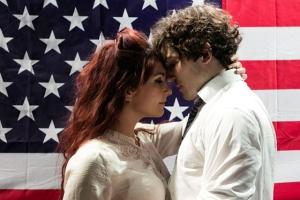The Fix, review of Dempsey and Rowe's political musical at the new Union Theatre
A stylish and well-sung revival of a tuneful and relevant musical theatre gem.
I've always had a soft-spot for John Dempsey and Dan P. Rowe's 1997 musical The Fix, which had its debut at the Donmar Warehouse under much fanfare by producer Cameron Mackintosh, but failed to win over the critics yet earned a solid and loyal following. Perhaps part of the reason that the show never quite latched on was that its grasp at political intrigue, which sees a Machiavellian mother scheming for her deadbeat son to become President following her Senator husband's early demise, always seemed too far fetched to be real yet not sharp enough to be satirical. As the American politics of 2016 seems to have "embraced tomorrow" and we've come to believe that literally anyone can be President, the entire concept becomes an easier pill for audiences to swallow, however horrifying that pill may taste.
That said, Michael Strassen's production aims to root the show in the 60s pre-Kennedy era, with its Mad-Men iconography which is never fully realised and feels unnecessary. Aside from some period costumes, and a pre-show Presidential walk-back that begins with (god help us) President Trump and flies through to JFK's Bostonian vowels, the early 60s aesthetic is not used to the production's advantage. Aligned with a score that features an electronic drum-kit and synthesizer, the clash of dates does little to highlight cultural relevance and instead only exposes the show as not being quite acerbic enough for modern times.
It's an effective and economical production that lets the lead characters take the limelight, using the bare brick wall and some wobbly tea trolleys to manipulate the settings, which handle the multiple time and locations admirably. A tightly drilled ensemble sway between news reporters, electorates and mobsters and play a significant role in Cal's kakistocracy, with some energetic choreography that helps bring the temperature of the room up to only just bearable.
Long since a haven for lovers of musical theatre, the new Union Theatre, situated just across the road, offers a much more pleasant and inviting theatrical space and suits the scale and demands of this production. With very little rake, any action below the waist is completely missed by audiences sitting anywhere beyond the first two or three rows, so anything on the floor or intricate dance steps are totally missed. Josh Sood's band perform exceptionally well, yet are forced to play so quietly that the score never really gets the opportunity to lift off. So often they feel apologetic, with the physical sound of the keys making more noise than the notes themselves as they are battling against acoustic vocals, which for a rock musical does both the actors and the material a huge disservice.
Dempsey and Rowe's score is vibrant and eclectic, if not a little 'box ticking' as it stretches itself to cover musical theatre styles from revivalist quasi-gospel to torch song, introspective ballad and even a hoe-down. The breadth however means there's much to enjoy, and it's tightly assembled by Sood's musical direction that keeps the company vocals especially well realised.
Fra Fee is a suitably dazed and despondent Cal Chander, providing the ultimate blank slate for manipulation by his slightly over hysterical mother Violet, played with stoicism and commitment by Lucy Williamson. Fee's vocals are almost too perfect for this rough around the edges character, and whilst he excels in the softer ballads, struggles to be heard in the more aggressive "One, Two, Three". He has the correct mix of charm and roguishness that the character demands and is believable in his efforts to whip up a crowd as well as ultimately crack under pressure.
It's Ken Christiansen as Cal's Uncle Grahame that steals the show in the meatiest and most defined role, which piles failed political aspirations atop of internalised homosexuality and childhood polio. It's a lot to carry, and Christiansen does so admirably, involuntarily making Grahame the centre of the show and the vital component of the second act. There's strong support from Madalena Alberto as the slightly underwritten stripper Tina who enables Calvin's habitual drug-use, and her second act ballad "Mistress of Deception" does much to prove why the musical should really be considered top-drawer material.
Overall the show is somewhat uneven in style and tone between the acts, with the slightly over indulgent first setting up too much of the narrative and not leaving chance for plot development. Whilst the first act holds numbers that drive the narrative and comment on the political machine, the media and the darker underbelly of society, the second act becomes introspective and overly reflexive, as though the audience has become a huge mirror that each character is forced to justify themselves in front of. As we watch each character and the political machine itself unravel, we're reminded of not only the fickle nature of government but also the dangers of personality politics which bears contemporary resonance in both Westminster and Washington. Watch and weep.
Originally published on
